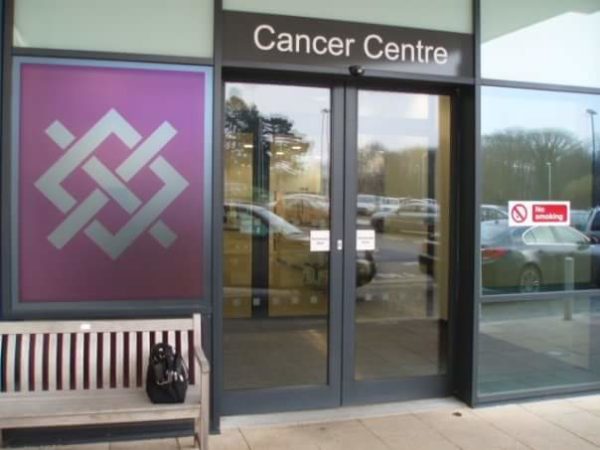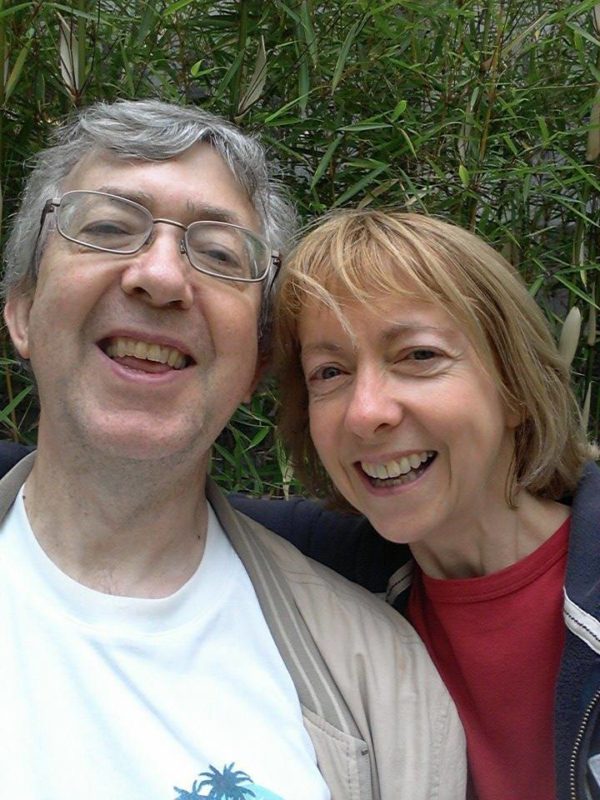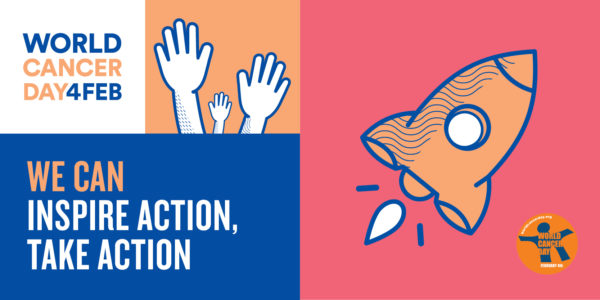Me and My Prostate Cancer – A Blog Post for World Cancer Day
Today – February 4 2017 – is World Cancer Day, so to mark this I am doing a special post on the subject of cancer and specifically my experiences with it.
I say experiences, as cancer has touched my life in various ways. My father died from cancer of the neck and my partner Jayne passed away three years ago from breast cancer. These were clearly horrible and distressing periods in my life, but in this post I want to focus on my own personal experience.
In my case, the lottery of life gave me prostate cancer. This is of course a very common cancer among men, but due to its nature it is not widely discussed. I hope talking about it here, and being as open and honest as I can, may help other men who have this condition or are worried they might.
So here’s my story. I was 58 and living on my own after my partner had passed away a year or so earlier. I had been diagnosed with an enlarged prostate some years earlier, but I started getting additional symptoms that concerned me (largely aches and pains in that region). One thing you often hear about prostate cancer is that an early symptom can be having to get up several times in the night to pee, but with an enlarged prostate that was old news to me, and I didn’t notice any particular changes anyway where that was concerned.
So I asked my doctor for a PSA (Prostate Specific Antigen) test. Although by no means 100% reliable as a test for prostate cancer, this can indicate when further investigation may be needed. When the day after my test I got a phone call from my doctor asking me to come and see him directly after afternoon surgery, I was pretty sure it wasn’t going to be good news.
Anyway, he told me my test result was 8.0. That’s not massively high but above the normal maximum of 4.0, so he wanted to perform a physical (rectal) examination. Initially at least he was quite reassuring, saying that my raised reading could be due to something as simple as sitting down for a long period, but he wanted to rule out anything more serious. A rectal examination is not the pleasantest of experiences, as any man who has had one will tell you, but as the prostate is situated directly beside the rectum this is the only way to access it physically.
Anyway, after doing this my doctor’s demeanour changed noticeably. I guess he felt a lump or something else that didn’t feel right. He didn’t say anything but immediately started writing out a referral form to the hospital. I could see the word ‘cancer’ at the top and that sent a bit of a shiver down my spine, although I had of course suspected it.
So off I went to see a urologist at Stafford Hospital, and he repeated the examination and referred me for more tests. One of these was an MRI scan, which was straightforward enough. Another was a bone scan. This likewise was no big deal, apart from the fact that it involved being injected with a small amount of radioactive isotope. It was therefore done in the bowels of the hospital behind various scary-looking warning signs.
The other diagnostic test, however, was the dreaded transrectal biopsy. I’ll say a bit more about that here, as I know it’s the one thing many men fear more than any other, and I’ve also seen a lot of misinformation about it in the media.
Table of Contents
My Prostate Biopsy
A biopsy involves taking samples of tissue from your prostate. It is really the only way they can be certain that you have prostate cancer, and also gives an indication of how aggressive it is.
The procedure is performed by an ultrasound expert using a special piece of equipment. It is actually not as painful as you might think, partly because a local anaesthetic is used, and partly because (I was told) there are no pain receptors in the rectum itself. Nonetheless, it is uncomfortable and does hurt for a few hours afterwards. If you need to have a transrectal biopsy, definitely get someone else to drive you home and be sure to take some paracetamol with you.
In my case I was fortunate to have my lovely sister Annie to accompany me and drive me to the hospital and back (a 40-minute journey). I didn’t bring any paracetamol with me, though, and found I couldn’t buy any at the hospital, so I had to get her to stop at Superdrug on the way back. Don’t make my mistake!
There is a risk of going down with an infection after any biopsy, especially (for obvious reasons) in the rectal area, but I have seen some ridiculous claims about this. You are given a shot of antibiotics directly before the procedure and have a short course of oral antibiotics to take before and after as well. The reality is that only a small proportion of people (about 3 percent) contract an infection, but the medics do like you to have someone in the house with you for at least one night afterwards just in case it happens. Again, my sister Annie stepped up to the plate. And no, I didn’t get an infection myself.
My Treatment
To no surprise, the biopsy and scans confirmed that I had prostate cancer. After discussing the options with a urologist (surgery would have been a possibility but he didn’t recommend it in my case) I was referred to a radiotherapy oncologist.
She (I was quite pleased it was a woman) told me I would need a standard treatment regime of hormone therapy combined with 37 sessions of radiotherapy. More about the latter shortly; I’ll talk about the hormone therapy first.
Hormone therapy for men involves taking a drug or drugs that stop your body producing testosterone. This doesn’t kill the cancer on its own, but as prostate cancer feeds on testosterone (that’s not a scientific way of expressing it but I think sums it up), it starves the cancer and shrinks it. She wanted me to go on hormone therapy for about six months before radiotherapy, in order to shrink the cancer first.
I started off on tablets then switched to three-monthly injections of a hormone therapy drug called Prostap. As mentioned, this effectively shuts down your body’s production of testosterone. As you might expect, this has side effects 🙁
One very common result is that you get hot flushes. Somewhat surprisingly I have never had this, although talking to other patients I consider myself fortunate in that regard. I did though find that it made me tire more easily and reduced my stamina, and I also put on some weight around the midriff especially. The most noticeable effect, however, was that it effectively switched off my libido.
I don’t want to go into too much detail about this here, as I’m sure you’ll understand, but I will say that there are various things you can do or take if this is a concern for you. Drugs like Viagra and Cialis will assist with the physical aspects, but won’t do anything about your sex drive. There are also various other options, including injections into the penis and a vacuum pump device. Suffice to say, some of these options are less appealing than others. Even if you are not currently in a relationship, though, it is still important to pay some attention to this bodily function. ‘Use it or lose it’ is an apt expression here. And that is all I will say on this subject!
Radiotherapy
 After six months I started my radiotherapy at the Royal Stoke University Hospital Cancer Centre (pictured). As mentioned earlier, this involved 37 sessions, with only weekends off. In effect, it became my day job for two months in the summer of 2015. Every day I had an hour’s drive to the hospital, including at least 20 minutes on the M6.
After six months I started my radiotherapy at the Royal Stoke University Hospital Cancer Centre (pictured). As mentioned earlier, this involved 37 sessions, with only weekends off. In effect, it became my day job for two months in the summer of 2015. Every day I had an hour’s drive to the hospital, including at least 20 minutes on the M6.
I had to arrive about three hours before my appointment time to complete what is euphemistically referred to as ‘prep’. This involves various preparatory tasks including drinking a lot of water to ensure your bladder is full and taking a self-administered enema. This all helps improve the targeting of the beam and ensure that other tissues are affected as little as possible, but of course it doesn’t make it a very joyous experience.
That summer was clearly a test of endurance, and I am forever indebted to various friends and relatives who willingly gave up their time to give me lifts, either part or all of the way, depending on where they lived. It was also great to have their company. Most weeks there were at least two days when I had someone with me. On the odd week when I didn’t, it definitely felt more of a grind. On the right you will see a picture of me and my sister Annie taken in the small garden within the treatment centre. As you can see, she is a lot more photogenic than I am!
Radiotherapy itself is non-invasive and painless (although I did get mild radiation burns towards the end of the treatment period). I did get tired and fed up, though, and the worst period was about a fortnight in, when I contracted some sort of virus. I didn’t want to stop my treatment, but I felt wretched for a week or so. I got over that eventually, however, and after that things went a little better.
I did get some urinary tract symptoms, including difficulty peeing at night, for which I was put on a drug called Tamsulosin. This is very common with radiotherapy patients, as the radiation causes a certain amount of collateral damage. The symptoms do ease gradually after treatment ends, but I still have to take Tamsulosin today and may have to for the rest of my life.
Going through two months of radiotherapy (or radiation therapy as the Americans call it) is an interesting experience, though not one I would wish to repeat. You get to know some of the staff quite well, and your fellow cancer patients even better. When you are finding it a hard slog their support and comradeship is very much appreciated, and of course a certain amount of black humour gets shared. “You only know you’ve been cured of cancer when you die of something else” is one gem somebody came out with…
Thirty-seven sessions seems like an eternity initially, but once you get past the half-way mark it seems to go a lot faster. I should like to place on record here my deepest gratitude to all the staff at the radiotherapy department of the Royal Stoke University Hospital for their kindness and consideration, and to my oncologist, Dr Bhana, for whose support and and professional expertise I owe more than words can say.
So Where Am I Now?
It is now around 18 months since I finished radiotherapy. I am still on hormone therapy as a precautionary measure to try to reduce the chances of a recurrence, but that will hopefully end this summer, or failing that (and it is partly my decision) summer 2018.
I have regular PSA tests every few months to monitor my health, and with these tests the general rule is the lower the figure, the better. Thankfully all my results so far have been very low indeed. Fingers crossed, that will continue to be the case.
Final Thoughts and Advice
Having been through the prostate cancer diagnosis and treatment process myself, I thought I would close by sharing some thoughts on it for anyone else who may be in the position I was…
- If you are at all concerned about prostate-related symptoms, ask your doctor for a PSA test. Prostate cancer is much easier to treat if it hasn’t spread, so don’t delay. Personally I think every man over 50 should have PSA tests regularly, but I am aware that this is somewhat controversial. Better to be safe than sorry, though.
- Don’t be put off by scare stories in the media. I have been staggered to read some of the ‘facts’ about prostate cancer promulgated in national newspapers. Prostate cancer CAN be treated and cured if caught early enough, so take action at the earliest opportunity, and take all the tests and treatments that are recommended for you.
- In particular, don’t be put off by scare stories about the biopsy. It is unpleasant and somewhat painful, but entirely endurable. And as long as you take your antibiotics as directed it is unlikely you will go down with an infection afterwards.
- Enlist as much support as you can from friends and family – both practical and emotional – to help get you through the treatment process. It really does make a massive difference.
- Don’t be put off talking about your condition. There is nothing shameful about getting prostate cancer (or any other cancer for that matter). It is not your fault, and has no bearing on who you are as a person.
- Don’t assume that a prostate cancer diagnosis is a death sentence. The plain fact is that most men who are diagnosed with this condition don’t die from it. But I can’t emphasise enough the importance of having it diagnosed and treated early.
More World Cancer Day Blog Posts
Please check out also these articles by my blogging colleagues on other types of cancer.
Sparkles at Midnight – Liver Cancer
Johanna Montana – Lymphoma
Art of Healthy Living – Mesothelioma
The Crafty Caker – Neuroendocrine Cancer
Kirsty Ralph – Stomach and Bowel Cancer
Jigsaw Parenting has two posts, one about Cervical Cancer and one about Acute Lymphoblastic Leukaemia
See also the World Cancer Day website, to learn how you can help boost awareness of different cancers and raise money for cancer research.
And, of course, if you have any comments or questions about this post, please do post them below and I will answer them if I possibly can.



February 4, 2017 @ 9:04 am
Thank you so much for sharing your story Nick. I personally did not know much about prostate cancer. I can understand why men would be put off going to get these things checked out. So glad to hear you are on the other side now and doing well. Nikki x
February 4, 2017 @ 10:07 am
Thank you, Nikki. Yes, part of my purpose in writing this article was to try to dispel some of the stigma attached to prostate cancer and encourage men to take action sooner rather than later. I am glad that your surgery for liver cancer went well.
February 4, 2017 @ 5:15 pm
Thank you so much for sharing this and trying to tackle the stigma. You hear it all over the news that prostate cancer is a big killer in the cancer world, but this wouldn’t be the case if people got it checked early. I’m glad to hear you’re doing okay now treatment is over, and I hope it continues to be that way 🙂
February 4, 2017 @ 6:13 pm
Thank you, Johanna. Yes, early diagnosis and treatment makes a big difference with all cancers but prostate cancer especially. I am glad you are doing well yourself after your own brush with cancer.
February 4, 2017 @ 10:43 pm
This is a very good post – thanks so much for sharing your experiences as I know it’ll help many people who may be panicking and scouring the internet for anything they can. It’s sad to hear about the amount of misinformation going around! We have a friend who is going through radiotherapy at the moment and reading this has been very enlightening indeed.
February 4, 2017 @ 10:54 pm
Many thanks, Lee. Glad you liked my post.
February 10, 2017 @ 11:17 am
This is such an informative post, thank you for sharing what must have been such a difficult time for you. My Mum is going through cancer treatment and the moment with chemo and the first of two surgeries under her belt so far, it’s such a cruel disease. I wish you well for the future.
February 10, 2017 @ 11:38 am
Many thanks, Clare. I hope your mother’s treatment is successful. Cancer is indeed a cruel disease, but new advances are being made every day, so there is always hope as well.